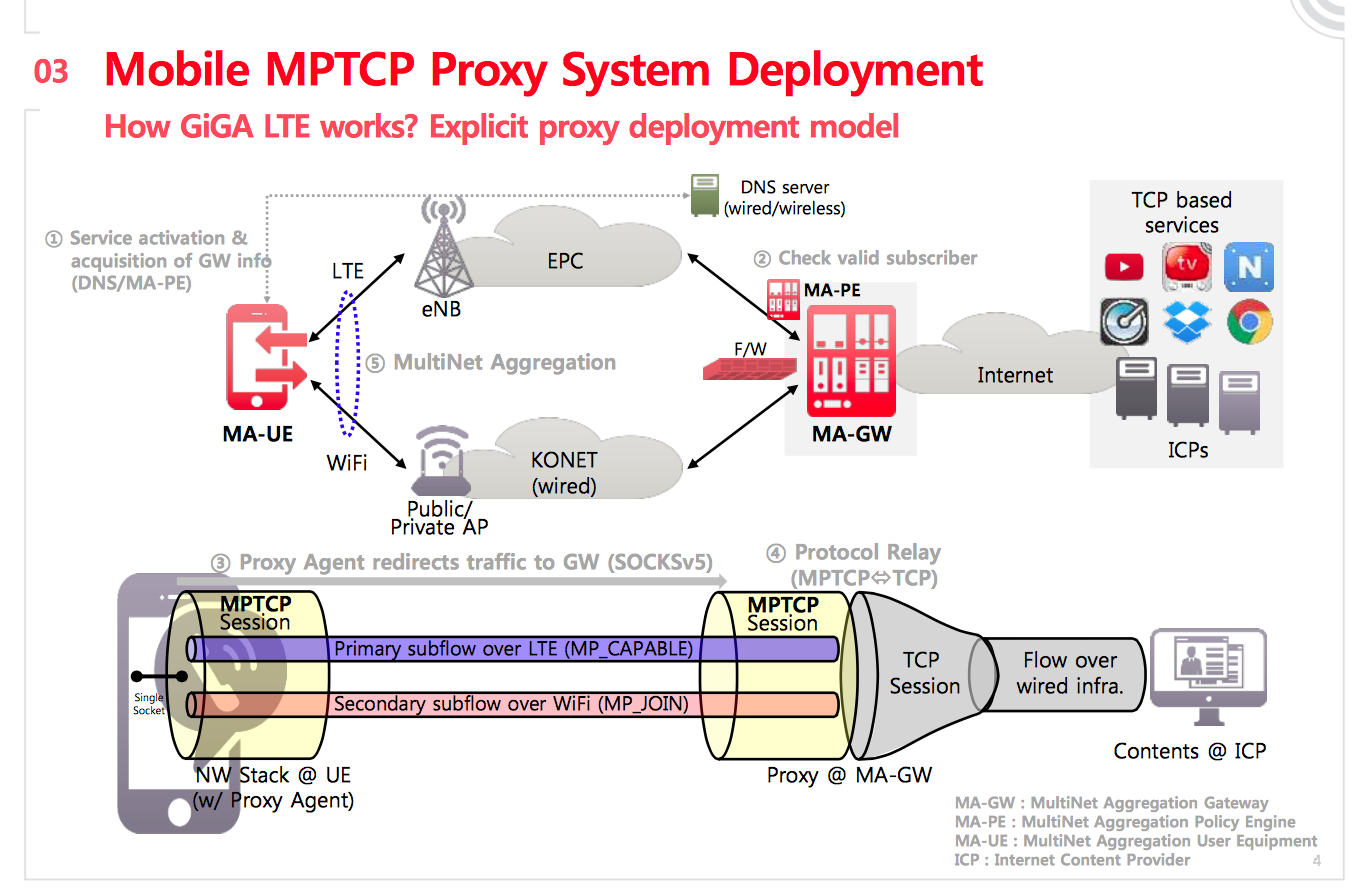In Korean, Multipath TCP is pronounced GIGA Path
http://blog.multipath-tcp.org/blog/html/2015/07/24/korea.html
In September 2013, Apple surprised the networking community byenabling Multipath TCP on all iOS devices . The main motivation forthis deployment was to support Apple’s voice recognition applicationand enable it to work seamlessly over both WiFi and cellular networks.Multipath TCP is a good match for this application, but it can also be usedfor other use cases.
At IETF‘93 in Prague, SungHoon Seoprovided several very interesting details of the Gigapath commercialservice that is now sold by KT. This service enables smartphoneusers to reach bandwidth of up to 1 Gbps on existing smartphones. Thisis probably the fastest commercially deployed mobile network. They achieve thishigh bandwidth by combining both fast LTE (with carrier aggregation) andfast WiFi networks on Multipath TCP enabled smartphones. Atthis stage, only the Samsung Galaxy S6 and Galaxy S6 Edge smartphones supportthe Gigapath service, but KT is working with other vendors to addMultipath TCP on their smartphones. Measurements presented atthe MPTCP Working Group meeting revealed that current smartphones areable to reach throughputs of about 800 Mbps out of a theoreticalmaximum of 1.17 Gbps.
What is more impressive is how the system has been implemented and howthe users can benefit from it. The figure below, extractedfrom SungHoon Seo’spresentation provides the general architecture of theGIGA Path system.

On the client side, the smartphones include the open-source Multipath TCP implementation in the Linux kernel. Samsung reused release 0.89.4 andbackported it in their Android kernel. The full source code of theirMultipath TCP kernel is availableonline
Enabling Multipath TCP on the smartphone is the first step indeploying it. However, this is not sufficient since there are veryfew servers that support Multipath TCP today. To enable theirusers to benefit from Multipath TCP for all the applications that theyuse, KT has opted for a SOCKSv5 proxy. This proxy is running on x86servers using release0.89.5 of the open-source MultipathTCP implementation in the Linux kernel.During the presentation, SungHoon Seo mentioned that despite the recentrollout of the service, there were already 5,500 active users onthe SOCKS proxy the last time he checked. Thanks to this proxy, thesubscribes of the Giga Path service in Korea can benefit from MultipathTCP with all the TCP-based applications that they use.
At the end of KT’s presentation, another network engineer mentioned thathe would come back to his management and propose a similar approachto deploy Multipath TCP in his network. We can thus expect otherlarge scale deployments in the coming months.





【推荐】国内首个AI IDE,深度理解中文开发场景,立即下载体验Trae
【推荐】编程新体验,更懂你的AI,立即体验豆包MarsCode编程助手
【推荐】抖音旗下AI助手豆包,你的智能百科全书,全免费不限次数
【推荐】轻量又高性能的 SSH 工具 IShell:AI 加持,快人一步
· 基于Microsoft.Extensions.AI核心库实现RAG应用
· Linux系列:如何用heaptrack跟踪.NET程序的非托管内存泄露
· 开发者必知的日志记录最佳实践
· SQL Server 2025 AI相关能力初探
· Linux系列:如何用 C#调用 C方法造成内存泄露
· 无需6万激活码!GitHub神秘组织3小时极速复刻Manus,手把手教你使用OpenManus搭建本
· Manus爆火,是硬核还是营销?
· 终于写完轮子一部分:tcp代理 了,记录一下
· 别再用vector<bool>了!Google高级工程师:这可能是STL最大的设计失误
· 单元测试从入门到精通